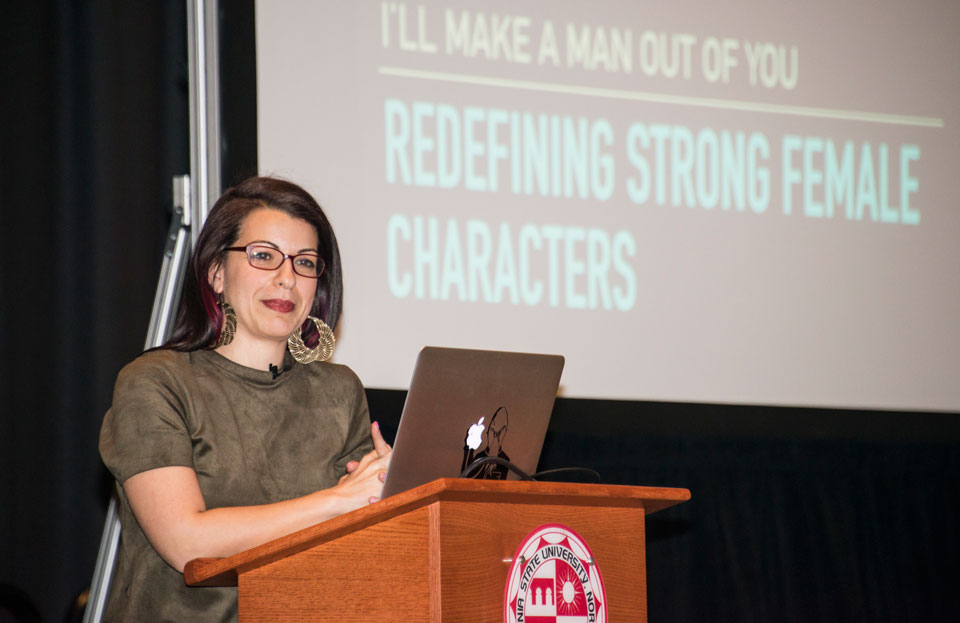Alumna Anita Sarkeesian Returns to CSUN to Talk About Women in Popular Culture

CSUN alumna and prominent media critic Anita Sarkeesian ’07 (Communication Studies) speaks about portrayals of women in film, television, video games and other popular culture, March 9, 2016 at the Northridge Center at the University Student Union. Photo by Lee Choo.
Less than a decade ago, Anita Sarkeesian ’07 (Communication Studies) sat in classrooms in Manzanita Hall as a student. On March 9, she packed an auditorium at California State University, Northridge, speaking as a prominent media critic on portrayals of women in film, television, video games and other popular culture.
The day after International Women’s Day, her alma mater welcomed back Sarkeesian, who presented a talk entitled I’ll Make a Man Out of You: Redefining Strong Female Characters. More than 200 people — most of them students and their professors — filled the Northridge Center at the University Student Union, which reached standing-room only by the time Sarkeesian took the stage.
“As viewers, I think we’re really starved for representations of powerful women,” said Sarkeesian, whose YouTube channel Feminist Frequency has more than 210,000 subscribers and whose videos have approximately 2.5 million views.
“I want to see the gendered associations with certain traits challenged and broken down,” she continued, citing dozens of examples of traits most often associated with men or women, such as “sensitive,” “independent” or “rational.” “None of these traits are innate or biologically coded to any particular gender — all of us are equally capable of empathy and manipulation, of coercion and compassion.”
In her presentation, Sarkeesian talked about female movie characters from the 1970s and ’80s, such as Ripley from the Alien movies and Princess Leia from the Star Wars saga. She also showed clips of characters from more recent movies and TV shows, such as Imperator Furiosa from Mad Max Fury Road — “She just didn’t really hold up. Furiosa is stoic and emotionless and violent and calculating.” — and Black Widow from The Avengers franchise — “She’s the Smurfette of the group, the only woman on an all-male team.”
“For these women to be identified as strong [in the media], they typically have to embody some of the more highly valued characteristics identified with men, while also avoiding those devalued traits associated with women,” she said.
In 2012, when Sarkeesian launched a $6,000 Kickstarter campaign to fund her video series on images of women, Tropes vs. Women in Video Games, she attracted the wrath of gamers who felt she threatened their culture and community. The backlash included rape and death threats, which persist to this day.
But the harassment she endured raised her profile as a feminist critic, and in 30 days her campaign had raised $158,000. In the years since, she has appeared as a TEDx speaker, on The Colbert Report, and TIME magazine named her to its 2015 list of “100 Most Influential People.”
“She exemplifies the things that we strive to have our graduates learn and be able to do in communication studies,” said her former professor Bernardo Attias of the Department of Communication Studies, who introduced Sarkeesian at the event. “She’s an outstanding communicator, and she has a passion for social justice. She put her communication skills to use, influencing audiences to make the world a better place.”
Attias praised Sarkeesian’s bravery in facing online harassment and threats, and her persistence in advocating for social and political change. During a Q&A session that followed her prepared remarks, students asked how Sarkeesian coped with being the target of harassment.
“It’s been four years … it is the background radiation of my life,” Sarkeesian said.
She noted that having strong support networks in her life and self care are her most important tools for coping with threats and harassment. She also recommended that others who face online threats take advantage of resources such as the online safety guide on Feminist Frequency’s website.
This year, Sarkeesian is taking advantage of her high profile to launch a new video series, Ordinary Women: Daring to Defy History, which she said is scheduled for release on YouTube in the fall. The series will profile overlooked women in history, such as Murasaki Shikibu, the 10th-century Japanese author who wrote the first modern novel.
“The series tells the stories of some women who’ve been written out of history,” Sarkeesian said.
Toward the end of her presentation, Sarkeesian spoke about some female characters in popular culture “who are getting it right,” such as Rey from the new Star Wars: The Force Awakens, Capt. Kathryn Janeway from the TV series Star Trek: Voyager and one of her personal favorites, Buffy Summers from the iconic TV series Buffy the Vampire Slayer.
“She’s a great example of someone with a very clear character development,” Sarkeesian said of Buffy. “She never uses her sexuality as power.”
She also noted the persistent deficit in strong roles for women of color, queer women and women with disabilities in popular culture, and she urged her audience to demand better.
“I do this work because I love pop culture stories,” she said. “Representations can help us to imagine what’s possible for ourselves … but we don’t have to settle for what we have now.
“It takes making a ruckus,” Sarkeesian continued. “We’re creating a culture where people are speaking up more … in a way that the people who make the decisions and the people who have power in these industries are having a much harder time ignoring it.”
Sarkeesian’s talk was presented by the CSUN Women’s Research and Resource Center, and co-sponsored by the College of Humanities, the Mike Curb College of Arts, Media, and Communication, and several other campus partners.
For more information about Sarkeesian and her upcoming video series, visit feministfrequency.com.

 experience
experience